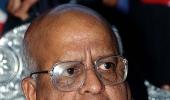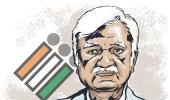T N Seshan, who passed into the ages last month. believed that toughness at every level is needed to keep the flock under him strictly duty bound, recalls Dr K S Parthasarathy, former secretary, Atomic Energy Regulatory Board.

T N Seshan, former chief election commissioner, died on November 10 this year. He was 86. He was a rare iconoclast and an able administrator. He served the state and central governments in many capacities. He received the 1996 Ramon Magsaysay Award for government service. His contributions to clean the election process and related procedures in India are legendary.
He knew the strengths and weaknesses of the political and ruling classes. He unhesitatingly used the powers of the chief election commissioner whenever the need arose.
Realising the importance of the media, he publicised his views promptly with characteristic wit and sarcasm. Reporters loved the one-liners he used to show his contempt for everyone including defaulting politicians. His personal idols were Rajiv Gandhi and Vikram Sarabhai.
'Palghat Brahmins came to excel in four fields, as civil servants and musicians, cooks and crooks,' Seshan did not spare anyone. While appearing in an advertisement, he said, 'I am a vegetarian, I eat politicians for breakfast.'
I first saw Seshan in action at a meeting in which Dr Anil Agarwal, founder-director, Centre for Science and Environment, made a presentation on the deteriorating environment in India. Shivraj Patil, then minister of state for science and technology and related ministries, members of Parliament on the parliamentary committee on science and technology, and officials from associated ministries attended.
Seshan, who was then secretary, ministry of environment and forests, noticed that one or two MPs were not present at the meeting. He proposed to Shivraj Patil that they may postpone the meeting to another day.
'Mr Seshan, am I not an MP?' the ever-smiling Shivraj Patil reasoned with the taciturn bureaucrat. Seshan agreed very reluctantly.
The PM, who presided over the meeting, wanted to settle some outstanding issues. He was unhappy that the parliamentary committee did not visit Sagar Kanya, a multidisciplinary research vessel owned by the department of ocean development.
The PM asked Dr Syed Quasim, the department secretary, to organise the visit in October itself. The MPs remonstrated; they wanted to be in their constituencies as October has several religious holidays. Believe it or not, there was no calendar in the hall to find out the holidays.
In his characteristic booming voice, Seshan confidently reeled off the dates of various holidays and other details. He had an elephantine memory.
Once I visited the ministry of environment and forests to invite Sundaram, then a joint secretary in the department, to participate in a national meeting on medical X-ray safety which the Atomic Energy Regulatory Board was organising in Mumbai. Sundaram was attending a meeting chaired by Seshan.
'Seshan will not accept any interruption,' Sundaram's PA told me. I found that if I had to invite Sundaram personally, I had to spend three hours for the meeting to conclude. It was an unnerving experience for me. I was used to a very different, congenial and informal atmosphere in Trombay.
Seshan believed that toughness at every level is needed to keep the flock under him strictly duty bound!

In a Facebook post, V V S Mani, who retired as a senior officer from the Bhabha Atomic Research Centre, vividly described a series of events when he was Seshan's co passenger in the executive class on an Air India flight from Vienna.
Seshan ordered a vegetarian meal and was about to eat his food. Suddenly he had some doubt and called the air-hostess and asked her about the food served to him.
She archly said 'It is roast lamb, why sir, would you prefer the other menu, fish fry? I can change it for you.'
That was when Seshan exploded like a volcano, Mani recalled. 'He unleashed a volley of abuses over the incompetence of the Air India staff.'
Red in her face, she apologised to him profusely. But that would not stop Seshan's raving and ranting, Mani added.
Having heard the commotion, the pilot, one Captain Raghavan, came to Seshan and tried to reason out with him.
Seshan became more belligerent. He was going to take up the matter with the civil aviation minister to point out how Air India staff cared only for foreign travellers and not Indians. He asked the pilot to bring the complaints book.
Just then a voice from the last row was heard saying, 'Mr Captain, when you bring the complaints book give it to me to record a few things like how the behaviour of some passengers is totally unacceptable and not in keeping with the dignity of senior government officials. Air India should take it up with the concerned ministry. When there is an inquiry, call me as a witness.'
All heads turned to see who it was. It was none other than Keshub Mahindra, the noted industrialist. 'When this admonition came, Seshan subsided like the effervescence of stale soda water,' Mani recorded the event faithfully.
Seshan worked as secretary of the Atomic Energy Commission from 1969 to 1972 when he must have got an opportunity to learn of the pre-eminence of India's atomic energy programme.
In The Degeneration of India, the book he co-authored, he was very uncharitable about India's atomic energy programme. Actually, he was against many projects. He opposed two major hydroelectric dam projects: The Tehri dam and the Sardar Sarovar dam in Narmada.
There were other instances of officers from the higher echelons of decision-making in the government with views against India's atomic energy programme. However, Seshan's was the language of an anti-nuclear activist. Nuclear scientists in India must share some blame for the lack of communication.
Surprisingly, in 1998, Seshan stated in an interview that he felt pride when India went nuclear.
The claim in his book (1995) that irradiated foods are 'not on markets because they are not safe and the health ministry has blocked their sale and consumption' is incorrect.
Health ministry officials among others wrote the Atomic Energy (Control of Irradiation of Food) Rules in 1991 and the amendment of Prevention of Food Adulteration Act (1954) Rules (1994) to approve irradiation of some foodstuff for domestic consumption. I was a member of the committee which drafted the former rule.
The Food Safety and Standards Authority of India under the ministry of health and family welfare published a consumer guidance note titled 'Irradiated Food is Safe, Busting myths around it'.
Eccentric, abrasive, publicity hungry, possessor of a remarkable ego, overbearing -- these are but some of the descriptions by supporters and detractors alike of T N Seshan. Beyond these negative words is the recognition that Seshan is also 'a revolutionary of sorts, hard working, an effective administrator, an able bureaucrat, a man for democracy, a hero of the intellectuals and middle classes, clean and honest', the Ramon Magsaysay Award foundation said of him.
By giving him the award, the foundation recognised his 'resolute actions to bring order, fairness, and integrity to elections in India, the world's largest democracy'.
Unalloyed, unbridled, adulation and hero worship may adversely impact anyone in any field. Seshan remained an exception to this rule.
Dr K S Parthasarathy is former secretary, Atomic Energy Regulatory Board.










